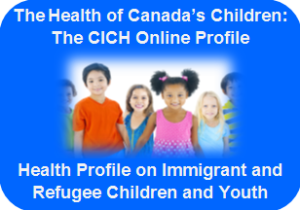Are Immigrant and Refugee Children and Youth Growing Up Healthy In Canada?
OTTAWA, May 19, 2015 – The Canadian Institute of Child Health (CICH), in partnership with the University of Ottawa and the Canadian Collaboration for Immigrant and Refugee Health has launched a new on-line module that examines the health of immigrant and refugee children and youth.
There are nearly 1 million immigrant children and youth living in Canada making up 10% of Canada’s children and youth. Immigrant youth smoke less, drink less, have fewer suicidal behaviours and are less likely to be obese than those born and raised in Canada. Despite this, life is not easy for all immigrant youth in Canada. Ten percent have been diagnosed with a mood disorder and 25% report not having a strong sense of belonging to their community. Immigrant youth are also five times more likely to have dental caries than Canadian born youth.
“Immigrant and refugee children and youth have unique attributes and needs that our systems should recognize and address”, says Louise Hanvey, CICH Scientific Director to the Profile. “Differences in values, culture, parental expectations, preventative health care or other factors require specific interventions as well as increased community, professional and public awareness. We need to be deliberate and proactive in creating inclusive approaches to immigrant and refugee families to better serve their health needs overall.”
In the past 30 years more than 70% of Canadians who were born outside Canada have originated from countries where vaccination coverage may be suboptimal or where several of the childhood vaccines that are routine in Canada are not part of the national vaccination schedule. These include vaccines for varicella (chickenpox), rubella (also known as German measles), diphtheria, pertussis (whooping cough), and tetanus. Immigrant children can therefore be at greater risk for these vaccine preventable diseases.
”There are many obstacles facing immigrant children, youth and their families regarding access to immunization”, explains Dr. Kevin Pottie, Associate Professor, Department of Family Medicine and Epidemiology and Community Medicine, University of Ottawa. “These include low socioeconomic status, lack of knowledge, negative beliefs about immunization and cost. Effective interventions must be developed to improve access including education, reducing out-of-pocket costs and providing clinics in non-traditional places such as schools and places of worship.”
Immigrant and refugee children and youth living in Canada may also experience the phenomenon of ‘cultural discordance or dissonance’, which is the perceived conflict or disagreement between a child/youth’s culture or origin and the culture in Canada. This often happens when families come to Canada with young children as these children grow up learning and following Canadian culture, which may be different from their parents’ heritage or home culture. This discordance can lead to serious repercussions including bullying, peer pressure and tension between youth and their parents.
The Canadian healthcare system is not easy for immigrant and refugee families to navigate or understand because health coverage is not consistent across Canada. In most provinces and territories, new permanent residents are provided with full health coverage from the time they arrive. However, in Ontario, British Columbia and Quebec, they must wait 3 months before being eligible. Those that do not receive coverage when they arrive are encouraged to apply for private health insurance until their provincial/territorial coverage begins. For those without financial means or language barriers this can be a major problem.
It is critical for the Canadian public health system to address the priority health conditions and challenges that might prevent immigrant children and youth from achieving the high quality of life that is possible in Canada.
“The Health Profile on Immigrant and Refugee Children and Youth in Canada is one of a series of on-line modules that form The Health of Canada’s Children and Youth: A CICH Profile. The Profile analyzes and synthesizes multiple data sources that are vetted by experts in the field and used by professionals to develop health policies, programs and services for children, youth and families. This new data rich module shines a light on the challenges faced by immigrant and refugee children, providing important considerations that will increase positive health outcomes for this unique and growing segment of the Canadian population”, says Dr. Denise Alcock, Co-Chair of the CICH Profile National Advisory Group.
Funding for the Health Profile on Immigrant and Refugee Children and Youth in Canada module was provided by the Canadian Institute of Health Research, Institute of Human Development, Child and Youth Health. View the complete module at: http://profile.cich.ca/en/index.php/chapter4/
Media Enquiries
Shelley Callaghan, CICH Profile Project Manager, Tel: 613-798-8029, Cell: 613-324-1798; Email: purpledog@sympatico.ca
Meghan Marcotte, CICH Profile Research Assistant, Tel: 613-230-8838 ext 229; Email: mmarcotte@cich.ca
Media Spokespersons
Dr. Kevin Pottie, Chair, Canadian Collaboration for Immigrant and Refugee Health, Family Physician and Principal Scientist, Bruyère Research Institute for Public Health
Louise Hanvey, Scientific Director, CICH Profile, Canadian Institute of Child Health
Dr. Robin Walker, Chair, Canadian Institute of Child Health, Co-Chair, CICH Profile National Advisory Group
Dr. Denise Alcock, Co-Chair, CICH Profile National Advisory Group



